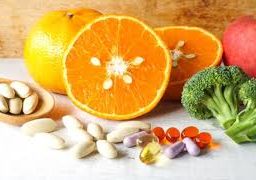Disclaimer: I’m not calling organic produce bad or good, nor am I calling conventional produce bad or good. I encourage every family to do their research and to buy what fits their needs.
#1. Pesticides are allowed in the growing of USDA Organic (United States Department of Agriculture) approved foods. There are over 40 pesticides on the allowable list that a farm can use and still get the USDA Organic stamp. So if not having pesticides is really important to you, know where your food comes from.
#2. Organic produce has no substantial vitamin or mineral advantage over conventional produce.
#3. You can’t rinse off pesticides from conventional produce. It’s within the plant, its in the flesh.
#4. Neither the USDA nor the NOP (National Organic Program) have any authority in other countries. So that “organic” garlic from China or tomatoes from Mexico? There’s no one beholden to USDA Organic standards inspecting the facilities it’s grown in.
#5. Organically grown and conventionally grown produce may be cross contaminated. Conventional produce and organic produce could be in the same field, one field or one farm over. There’s no specific guidelines for how far apart organic and conventional produce must be grown. You don’t know how they spray the conventional produce. If they crop dust from a plane, those pesticides are going to get on the organic produce.
#6. The “Clean Fifteen” is a list of conventional produce with the LEAST amount of pesticide residue. The Clean Fifteen include: broccoli, corn, avocados, pineapples, cabbage, onions, peas, papayas, asparagus, mangoes, eggplant, honeydew, kiwis, cantaloupe, cauliflower and grapefruit.
#7. The “Dirty Dozen” is a list of conventional produce with the highest amount of pesticide residue. The Dirty Dozen includes: strawberries, spinach, nectarines, apples, peaches, celery, grapes, pears, cherries, tomatoes, bell peppers and potatoes.
#8. Glyphosate, malathion, diazinon are 3 common pesticides in Round Up, used in conventional farming. These ingredients, are showing stronger and stronger links to cancer, non-Hodgkin lymphoma, kidney disease, Parkinson’s and birth defects. These chemicals specifically are never used in organic farming.
#9. Just because something isn’t labeled organic doesn’t mean it isn’t organic. There are companies who either can’t or don’t wish to pay for USDA Organic certification, so they’ll label their foods “Natural” or “all natural.”
#10. Processed food labeled “organic” is still processed food. Organic cookies still have the same amount of calories, fats, carbs and sugar as regular cookies. I know this is not a produce fact, but I thought we all needed to get on the same page! 🙂








